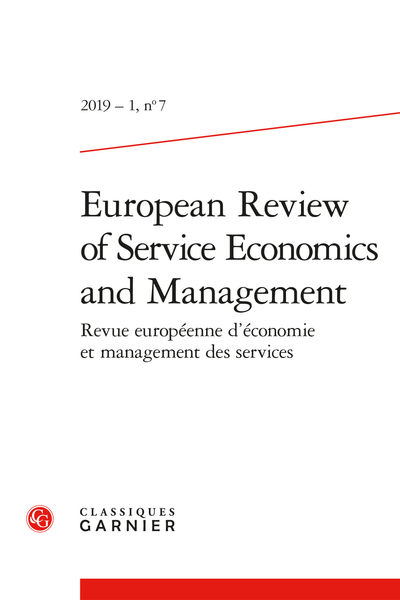
Marchés émergents et développement des services touristiques
- Type de publication : Article de revue
- Revue : European Review of Service Economics and Management Revue européenne d’économie et management des services
2019 – 1, n° 7. varia - Auteurs : Desmarchelier (Benoît), Fang (Eddy)
- Résumé : Les services touristiques connaissent un changement qualitatif avec le développement économique : initialement, la principale demande à satisfaire est composée de touristes étrangers, alors que les nationaux gagnent ensuite en importance. Les deux articles présentés ici soulignent cette dualité. L’article de Ha V. Luong examine les spécificités du Vietnam aux yeux des touristes étrangers, tandis que Yingchan Luo, Linjia Zhang et Jingjing Du étudient les comportements de réservation des touristes chinois.
- Pages : 81 à 82
- Revue : Revue Européenne d’Économie et Management des Services
- Thème CLIL : 3306 -- SCIENCES ÉCONOMIQUES -- Économie de la mondialisation et du développement
- EAN : 9782406092308
- ISBN : 978-2-406-09230-8
- ISSN : 2555-0284
- DOI : 10.15122/isbn.978-2-406-09230-8.p.0081
- Éditeur : Classiques Garnier
- Mise en ligne : 20/05/2019
- Périodicité : Semestrielle
- Langue : Anglais
- Mots-clés : Tourisme, développement économique, changement qualitatif, comportements, modèle d’affaires
Emerging Markets
and the Development
of Tourism Services
Benoît Desmarchelier1,a
Eddy Fang2,b
a University of Lille, France
b Xi’an Jiaotong-Liverpool University, China
Services represent an ever-increasing share of employment and output in emerging economies. This growth is accompanied by a process of diversification and sophistication: brand new services are being delivered, and many see their business models reinvented, for instance with the use of social media to customize propositions of value. Among service activities, tourism also presents the specificity of being a major source of income in all stages of development. In traditional societies, much effort is spent on the provision of services for inbound foreign tourists, while in emerging markets the rise of middle classes also creates domestic markets for tourism services. This major qualitative change in the demand side is a potentially powerful driver for the emergence of new services in – and in relation to – the local tourism industry.
Vietnam stands as a perfect archetype of this process of progressive replacement of foreign visitors by domestic tourists in touristic spending, since 50.7% of this spending was made by foreigners in this country in 2017 (WTTC, 2018a, p. 3). Foreign tourists are hence still a major source of touristic income, but nonetheless service providers will need to 82increasingly adapt their offerings to local preferences and requirements. In this context, Luong’s contribution to this special section investigates the attributes that make Vietnam standing out as a location in the eyes of foreign tourists in their post-trip reports on social medias.
On the other hand, China provides a case of a tourism service demand that is increasingly domestic in nature. Indeed, Chinese nationals represented as much as 87% of tourists’ spending in China in 2017 (WTTC, 2018b, p. 3). Luo, Zhang and Du are hence focusing on the study of Chinese tourists’ behaviours – in particular their propensity to use social media platforms when making booking decisions. Interestingly, the study finds significant age and gender difference.
Collectively, the two papers in this special section exemplify the complex equation facing service firms in touristic sectors of developing countries when elaborating their business model. The demand is indeed rapidly evolving and the greater importance of nationals implies concurrently facing heterogeneous consumers’ profiles. This diversity comes both from abroad, with the mix of international and domestic travelers, as well as from within the country, with rapid economic growth generating increasing gaps between generations. Reading from these papers, social media seem a promising tool to address this increasing heterogeneity.
References
WTTC (2018a), Travel & Tourism Economic Impact 2018, Vietnam.
https://www.wttc.org/-/media/files/reports/economic-impact-research/countries-2018/vietnam2018.pdf (last access: 20 Dec. 2018)
WTTC (2018b), Travel & Tourism Economic Impact 2018, China.
https://www.wttc.org/-/media/files/reports/economic-impact-research/countries-2018/china2018.pdf (last access: 20 Dec. 2018)